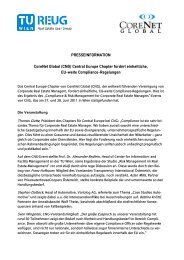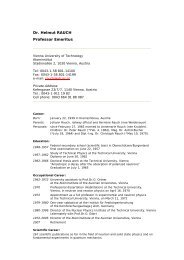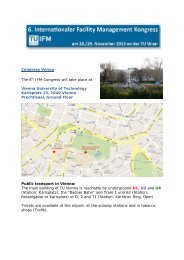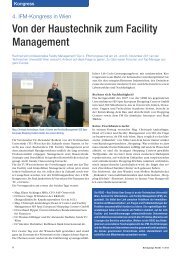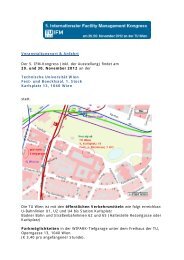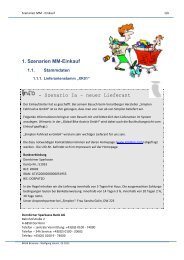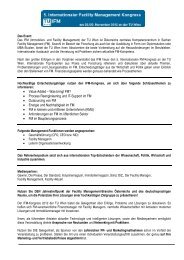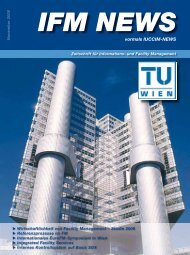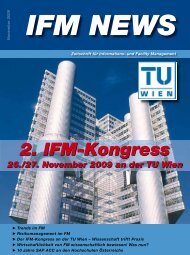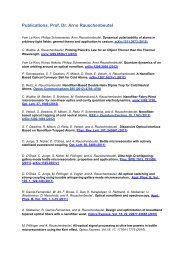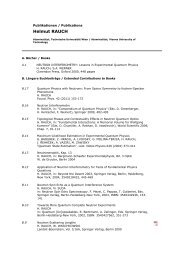Informal Market Worlds - Institute TU Wien
Informal Market Worlds - Institute TU Wien
Informal Market Worlds - Institute TU Wien
Create successful ePaper yourself
Turn your PDF publications into a flip-book with our unique Google optimized e-Paper software.
A two‐day research forum on the trading places of urban informality, co‐organized by the University ofHong Kong’s Shanghai Study Centre and the FWF Science Fund research project Other <strong>Market</strong>sINFORMAL MARKET WORLDS IIprogrammeThursday November 8 th , 2012 PRESENTATIONS10:00 Welcome10:15 Opening remarksPascal Berger, Shanghai Study Center10:30 <strong>Informal</strong> <strong>Market</strong> <strong>Worlds</strong>, IntroductionPeter Mörtenböck, Helge Mooshammer, <strong>TU</strong> Vienna & Goldsmiths College, University of London11:45 The <strong>Market</strong> & the TerritoryBert de Muynck, Shanghai Study Center12:30 lunch break14:00 How the City Moved to Mr SunDaan Roggeveen, Shanghai Study Center15:00 Fate or Free Will? Yudaishan urban village in Chongqing, a case studyBrechtje Spreeuwers16:00 break16:30 Pirate Media <strong>Market</strong>s: From national to recycled modernityLawrence Liang17:30 Domestic Helper: Mapping a critical spatial occupation of Hong Kong CBDValerie Portefaix & Laurent Gutierrez, MAP Office Hong Kong18:30 break19:30 Districts as Relational <strong>Market</strong>s ‐ Central JakartaAbdouMaliq Simone, Goldsmiths College, University of London
Friday November 9 th , 2012EXCURSION & DISCUSSION10:00 Walking tour to construction workers’ markets adjacent to SSCled by Daan Roggeveen11:30 Excursion (by coach, registration required) to Urban Villages in the Shanghai arealed by Steven Chen, Brechtje Spreeuwers and Daan Roggeveen13:30 lunch break15:30 return to Shanghai Study Centre16:00 Beyond Improvement – How the informal challenges our notion of practicepanel discussion with all speakerschaired by Matias Viegener, Fallen Fruit, Los AngelesSaturday November 10 th , 20129:30 ‘<strong>Informal</strong> <strong>Market</strong> <strong>Worlds</strong>’ atlas and text bookPublications and future collaborations<strong>Informal</strong> get together at Broadway Mansions Hotel10:30 Shanghai State of Affairslecture series at Shanghai Study Centreorganised by Bert de MuynckVENUE:University of Hong KongShanghai Study Centre298 North Suzhou Road, near North Sichuan RoadShanghaihttp://fac.arch.hku.hk/sscThis event is free and open to the publicSupported by
A two‐day research forum on the trading places of urban informality, co‐organized by the University ofHong Kong’s Shanghai Study Centre and the FWF Science Fund research project Other <strong>Market</strong>sINFORMAL MARKET WORLDS IIabstracts and biosPascal Berger, University of Hong Kong, Shanghai Study CentreBorn in Basel, Switzerland; he studied architecture at the ETH in Zurich, where he got his master degree.Pascal was working for Diener & Diener in Basel, Franz Oswald in Berne and mada s.p.a.m. in Shanghai.He is a founding partner of playze Switzerland and playze China and is currently living in Shanghai.Since 2009, Pascal has been teaching at the University of Hong Kong’s Shanghai Study Centre. He holdsthe position of academic director.Helge Mooshammer + Peter Mörtenböck, <strong>TU</strong> Vienna & Goldsmiths College, University of London<strong>Informal</strong> <strong>Market</strong> <strong>Worlds</strong>Recent practices in art and architecture reveal a widespread interest in informality, which is oftenpraised for its resourcefulness and ingenuity, its flexibility and improvisation, as well as its colourful andcreative appeal. However, when it comes to concrete terms of engagement, the most commonresponses to informal urbanism tend to centre on questions of improvement. In this sense, therelationship between architecture and informality seems to be a more or less clearly defined oneinvolving the offer of expert support to help raising the living standards of the world’s poor.In our introduction to this research meeting we will raise the question what is really at stake in therelationship between the profession of architecture and urban planning and the growing realm ofinformality: What value systems, economic and political interests are impinging on this process?Helge Mooshammer is Director of the Austrian Science Fund (FWF) research projects Other <strong>Market</strong>s(2010‐2013) and Relational Architecture (2006‐2009) at the School of Architecture and Urban Planningat Vienna University of Technology and Goldsmiths College London. His research focuses on new formsof urban sociality fuelled by processes of transnationalisation, temporary and informal land use and newforms of government. In 2008 he was Research Fellow at the International Research Center for CulturalStudies (IFK) Vienna. He has been teaching, amongst others, at the Linz University of Art, at the MerzAcademy Stuttgart and at Goldsmiths College, University of London.His most recent books include: Networked Cultures: Parallel Architectures and the Politics of Space, (ed.with Peter Mörtenböck) Rotterdam: NAi Publishers, 2008 and Space (Re)Solutions: Intervention andResearch in Visual Culture, (ed. with Peter Mörtenböck) Bielefeld: transcript, 2011.Peter Mörtenböck is Professor of Visual Culture at the Vienna University of Technology and ResearchFellow in the Department of Visual Cultures at Goldsmiths, University of London, where he has initiatedthe Networked Cultures project (www.networkedcultures.org), a global research platform focusing ontranslocally connected spatial practices. His current research projects, including amongst others Other<strong>Market</strong>s (2010‐2013), Sea of Marble (2010‐2011) and Supply Lines (2011‐2014), investigate the potential
Daan Roggeveen studied architecture at Delft University of Technology. Next to his work as founder anddirector of Go West Project, he is the Curator of the public programme at University of HongKong/Shanghai Study Centre. He is an often‐asked contributor to the debate about urban developmentin China.info@gowestproject.comwww.gowestproject.comBrechtje Spreeuwers, ShanghaiFate or Free Will? Alternative Development Strategies and DesignYudaishan urban village in Chongqing, a case studyUrban villages ( 城 中 村 , chengzhongcun) are former peasant villages that in China’s recent urbanizationprocess got enclosed by neighboring growing cities. An enormous demand for affordable housing in theChinese city of today thereupon ensures consolidation and growth of urban villages. Indigenousresidents of urban villages, most of them originally farmers, satisfies this demand for affordable housingby renting out their inexpensive, but often illegally and poorly constructed extensions to their familyhomes (Liu et al., 2010; Zhang et al., 2003). Hence, the rental housing market in an urban village reflects‘a mutual beneficial support between two groups of peasants [indigenous farmers and rural migrants]during the course of economic transformation’ (Zhang et al., 2003). Other roles of urban villages lie inproviding spaces for small‐scale open markets as well as human interaction. Moreover, residents oftenmention ‘human scale’ and intimacy as strong qualities of their direct environment. However, in thetransition from a farmer village to a fully grown urban village, lack of planning and building regulationsin combination with villagers’ pursuit of maximum profits often lead to extremely high densities anddilapidated environments. Therefore, local governments tend to refer to the phenomenon of urbanvillages as ‘cancer in the city’, places of crime and an agglomeration of all sorts of illegal activities (Du,2010). In combination with a profit‐led real‐estate market and central locations of most urban villages,this attitude often results in a massive short‐term demolition strategy, thus also obliterating the socialand spatial characteristics of these villages. Current research around urban villages mainly evolvesaround analysis and offers few if any practical alternatives to prevent short‐term demolition strategies.Hence, the gap between research, urban planning and design widens, while the actual interplaybetween them potentially offers more than just the sum of its parts. Based on a specific design proposalin Yudaishan urban village in Chongqing and by conducting ‘research by design’, this study aims atbridging this gap.Brechtje Spreeuwers recently graduated in both Architecture (MSc) in Delft and Sinology (MA) in Leiden.Her graduation project focused on the emergence of urban villages in China and provided anintervention of Yudaishan urban village in Chongqing. Her final thesis is currently under review forpublication. In the past few years she participated in a range of international design workshops andseminars in Delft (INDESEM), Chengdu (Urban Emergencies), Beijing (IFOU) and Wuhan (ISOCARP YPPWorkshop). She also collaborated in the Chinese – Dutch translation of a collection of short stories by SuTong that is forthcoming from publishing house ‘de Geus’ in January 2013. At present, she works on afull‐time basis as a researcher at the Go West Project in Shanghai.
AbdouMaliq Simone, Goldsmiths College, University of LondonDistricts as Relational <strong>Market</strong>s—Central JakartaThis presentation analyzes the emergence of new frontiers of global capital accumulation, notably howspaces of informalized poverty are transformed into global markets. It traces the actual practices ofglobal capital through which the world's "bottom billion," the billion or so people living under conditionsof extreme poverty, are reimagined as assets, and even as an asset class of global investment. However,such an assemblage is fragile, subject to both contradiction and contestation, and this fragility makespossible new formations of the political.AbdouMaliq Simone is an urbanist with particular interest in emerging forms of social and economicintersection across diverse trajectories of change for cities in the Global South. Simone is presentlyProfessor of Sociology at Goldsmiths College, University of London and Visiting Professor of UrbanStudies at the African Centre for Cities, University of Cape Town. Key publications include, In WhoseImage: Political Islam and Urban Practices in Sudan, University of Chicago Press, 1994, For the City Yet toCome: Urban Change in Four African Cities, Duke University Press, 2004, and City Life from Jakarta toDakar: Movements at the Crossroads, Routledge, 2009.Matias Viegener, Fallen Fruit & CalArts, Los AngelesMatias Viegener is a Los Angeles based writer, artist and critic who works alone and collaboratively inthe fields of writing, video, installation and performance art. His work has been exhibited at The LosAngeles County Museum of Art (LACMA), Yerba Buena Center for the Arts, Ars Electronica, The WhitneyMuseum, The Kitchen, The Drawing Center, LACE, Machine Project, the LA Museum of ContemporaryArt (MOCA), and the La Jolla Museum of Contemporary Art. He is a co‐founder of Fallen Fruit, aparticipatory art practice focusing on fruit, urban ecology and public space, which has shown workinternationally in museums and galleries.Viegener is the author of 2500 Random Things About Me Too, a book of experimental writing, and hasco‐edited two books, The Noulipian Analects and Séance in Experimental Writing with ChristineWertheim. He is the editor and co‐translator of Georges Batailles' The Trial of Gilles de Rais. His fictionand non‐fiction can be found in Afterimage, American Book Review, Artforum, Art Issues, ArtUS,Artweek, Black Clock, Bomb, Cabinet, Cargo, Critical Quarterly, Fiction International Framework, HighPerformance, The Journal of Aesthetics & Protest, Paragraph, Radical History Review, Semiotext(e),Suspect Thoughts, and X‐tra, for whom he writes regularly on visual art, as well as numerousanthologies. His academic criticism appears in Writing at the Edge: The Work of Dennis Cooper; QueerLooks: Lesbian & Gay Experimental Media; and Camp Grounds: Gay & Lesbian Style. Literary executor forthe writer Kathy Acker, he has written and lectured extensively on her work, and edited a volume of herletters for Chiasmus Press. He is currently completing an academic study of her books.
Contact:Helge MooshammerVienna University of Technology / Goldsmiths College, University of Londoninfo@othermarkets.orgPascal Berger,University of Hong Kong, Shanghai Study Centrefac.arch.hku.hk/sscSupported by




